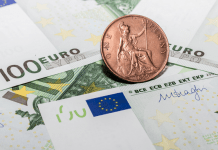- Pound (GBP) falls with CPI data & BoE in focus
- BoE rate decision is due next week
- Euro (EUR) rises after ECB’s Lane says no intervention in bonds necessary
- EZ Q1 wage growth jumps
The Pound Euro (GBP/EUR) exchange rate is falling, after gains last week. The pair rose 0.63% in the previous week, settling on Friday at €1.1848 and trading in a range between €1.1911 and €1.1777. At 14:00 UTC, GBP/EUR trades -0.25% at €1.1825.
The pound is falling against the euro and the US dollar ahead of a busy week in the markets. The Bank of England’s interest rate decision and UK inflation data will be released.
The UK consumer price index is due on Wednesday and is expected to show the headline rate rose by 2% YoY in May, down from the 2.3% increase in April. This is expected to be due to falling household energy bills, while Bank of England policymakers are much more focused on wage growth and service sector inflation.
Data last week showed that UK wages rose more quickly than expected, which, along with sticky service sector inflation, could delay the BoE’s first rate cut.
The Bank of England is unlikely to cut interest rates at this week’s meeting, given the blackout period for the elections. However, the central bank could prepare the market for an interest rate cut in April.
The euro is rising as the market recovers some losses from last week when political uncertainty in the region plunged the common currency lower.
The market has been concerned that the new French government, whether far left or far right, will spend heavily, weakening France’s fiscal position and raising debt levels to dangerous levels. As a result, French bond yields rose to the highest level in four years last week, reflecting the financial markets’ concern and pulling the euro and French stocks lower.
Today, ECB chief economist Philip Lane soothed the markets by saying that no intervention in the bond market was necessary.
The euro has started the new week well, thanks in part to stronger-than-expected labour wage data from the eurozone. The data showed Labour costs rising to 5.1% in the first quarter, up from 3.4% in the previous quarter and 4.9% expectations.
ECB policymakers have previously warned that high wage growth amid a tight labour market could hinder the rapid reduction of rates.





